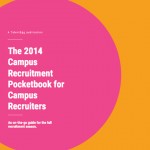Your business is multifaceted – from the engineers who design your projects to the marketers who share your achievements with the world, your organization depends on talented individuals from diverse professional backgrounds.
Competition for student and grad talent is rising in every market, and competing for highly-engaged, quality talent is a daily reality for campus teams across different industries.
As your talent needs grow, the question becomes: how do you build a brand that resonates with different segments of the Gen Y talent pool while remaining focused and on-brand?
Share your story
Storytelling is an effective tool to build relationships with consumers and strengthen the bond organizations have with their target market.
Consumer attention is pulled in many directions, and businesses want to be able to capture it in a way that’s different, memorable and drives people to action.
When done right, storytelling can help inform talent about the role they’ll play within your organization and enable them to see a connection between their role and the larger collective.
Students and grads are also pulled in many directions by competing employer brands, a fact that presents unique hurdles to campus teams who want to attract and engage with Gen Y. For organizations that hire across a variety of functions, storytelling can add real value to their recruitment efforts.
Gen Y craves authenticity and rejects disingenuous, empty messaging. No matter their academic or professional background, students and grads want to know the real ‘story’ behind your employer brand.
If you want to build a high-performing team and be seen as an employer of choice across the entire talent spectrum, your story has to be authentic.
Build your story
So where do you start? You’ve already started to humanize your online presence – building out a story is a continuation of that process.
Take stock of the qualities that make your employer brand unique in order to focus your message. As you compile a list, ask yourself whether each aspect adds value to your overall story: you want to focus your story on the qualities that make your employer brand interesting. The goal is to be poignant, not overloaded.
Questions to consider as you build out your story include:
- Why do we do what we do?
- What inspired our business to start?
- What has our evolution been?
- What motivates people to come into work every day?
You can also support an authentic tone by asking your workforce to contribute to the process. Organize a group of representatives from different areas of your business and ask them to brainstorm words that come to mind when they think of your company. Ask them to come up with a list of descriptive words about their experience, or to come up with additional ideas for aspects that make your organization unique.
Once a list has been compiled, ask the group to rank these points in order of importance. What results from this process is genuine insight and an authentic voice to use when telling the story of your company, culture, people and values.
Case studies
- TJX Canada found a unique way to share their employer brand story with Gen Y talent. Check out one of the open opportunities listed on their TalentEgg employer profile: every listing features a “Meet ___” section that tells the real story of a real team member working in the same role. The section effectively tells part of TJX Canada’s employer brand story and adds value to the organization and to the talent that reads it: TJX Canada establishes an employee profile that prospective candidates can use to assess their own fit (resulting in more qualified applicants) and talent gains a deeper understanding of how they’ll fit into the overall picture.
- Hire Vue, a digital interview platform, does an exceptional job of using their employer brand story to target different segments of the talent pool. Watch these videos first (Engineering, Sales and User Experience & Design). Each one tells an incredibly candid and engaging employer brand story – they feature real people having real conversations about who they are, where they came from and why they chose to work at Hire Vue. While not every organization at Hire Vue has their own video, all have their own dedicated pages that effectively convey who they are and why they matter to the company’s story.
- Deloitte takes to Twitter to tell part of their employer brand story. Take a look at their Campus Twitter feed. The firm has guest tweeters – real employees – take over their Twitter feed for a work day. Guest tweeters are encouraged to share highlights and other, giving Gen Y talent a unique opportunity to “job shadow”!
Discussion: How does your organization target talent from different academic backgrounds?






Leave a Reply
You must be logged in to post a comment.